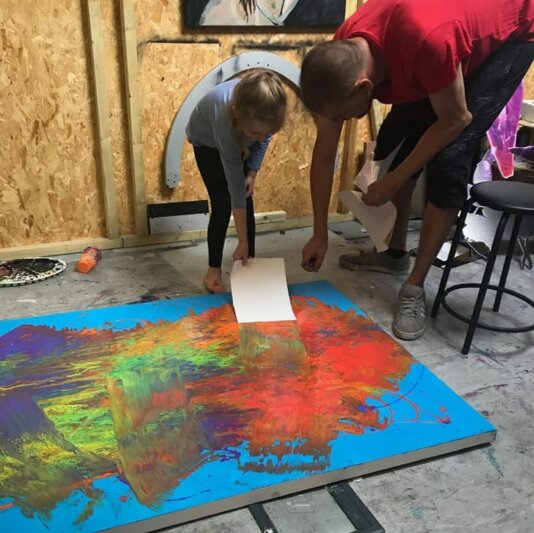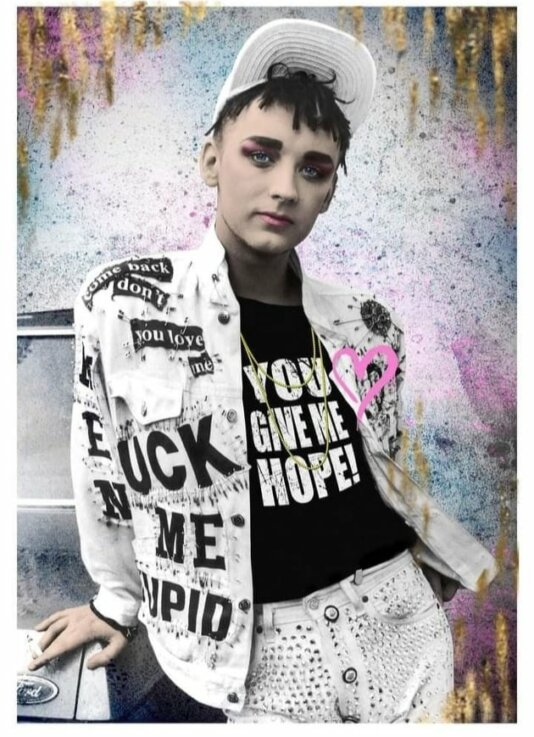- About
- Topics
- Story
- In-Depth
- Picks
- Opinion
- News
- Donate
- Signup for our newsletterOur Editors' Best Picks.Send
Read, Debate: Engage.
| November 15, 2021 | |
|---|---|
| topic: | Arts |
| tags: | #homelessless, #Adrian Ekenhall, #United Kingdom |
| located: | United Kingdom |
| by: | Anu Shukla |
One of Ekenhall's ways to feel empowered is to transform his illness into art. With the help of doctors, Ekenhall (aka FkHead), took one cubic centimeter of solid mass from a cancerous kidney, solidified and ground it, then mixed it with paint to sign a series of sculptures and paintings.
He told FairPlanet that the act of creating the work in this way is “symbolic” because it shows “I took back control from something I have no control over. I’m almost caring for it. I feel if you love something that’s hurting you, you can also take away its power.”
The first part of Ekenhall’s art series features a head sculpture and illustrates a poem he wrote titled, ‘The dreaded c word,’ featured in a self-published book with a collection of other poems to complement a series of artworks. He said that half the money from book sales will go to the cancer centre at London’s Guy’s hospital.
The 42-year old spoke rapidly as he told me his life story over the phone in a strong cockney accent.
An accident he was involved in while being homeless two years ago had led to four spinal fractures, a shattered wrist and to the discovery that he had stage three cancer. “They still discharged me back onto the streets,” he said.
Ekenhall’s remarkable rags-to-riches-to-rags tale is one of fascinating determination and conviction. He’s now in the throes of making his mark again; this time, underscored by a vision to leave a legacy for his daughter, Isla.
But everything that’s wrong with the UK’s broken welfare state can be understood after a conversation with Ekenhall.
Along his journey, he has transitioned from the domestic hell of an abusive childhood and teenage homelessness to earning a six-figure salary before the financial crash found him back on the streets in 2008, and again in 2019.
In his 20s, Ekenhall smashed an addiction to alcohol and drugs with art and poetry “whenever [he] had the urge to get high,” and scored a job as a door-to-door salesman.
“My employers had no idea I was still on the streets but I worked my way up to area manager.” Three years later, he was selling Bordeaux wines before clinching a job as a business development manager at the Bank of Scotland Merchant Services. Finally, he had lost it all to the economic slump.
But it’s taken Ekenhall at least a decade of fighting the system to get back on his feet, some of which he spent in temporary accommodation, provided in 2012, by the UK homeless charity St Mungo’s.
About his experience with St.Mungo’s, he said: “They kicked me out until I paid the service fee, even if it meant begging, which is illegal. And it’s while I was out begging for the money to pay them that I was stabbed three times in the neck, so I blame them for that. I was only £80 behind, even though they got £1,200 a month Housing Benefit from the government for me to be there.”
Ekenhal, who has worked in south London’s anti-knife campaign, Lives not Knives, said he has forgiven his attacker. “If I met him now I would try and work with him. He was a repeat offender; the system clearly failed him. Maybe it would take a person he’s hurt to help him change. He must have been in a dark place if that was his only response. I feel sorry for him.”
But Ekenhall said he was not the only one to be “thrown out” by the homeless charity. He claims that scores of others were given the same ultimatum to pay up or get out until they could foot the bill. “People started living outside the gates in protest with furniture found on the street. The council tried clearing up but we found more beds, tables, chairs. It was like a mini Calais refugee camp.”
He said adequate social housing in the UK is a far and distant dream: “There’s just so many people on the streets and local governments don’t have funding.”
Ekenhell did finally get re-housed, but this development is recent, taking place “just two months after they removed my kidney,” he tells me.
Eighteen months ago though, Ekenhall was still sleeping rough by night. By day, he networked the London art scene, and aimed to launch UK Colab - his online gallery, clothing line and artist management company.
The project took shape while he slept on the floor of an art studio, rented with the little money he had. “I wasn't meant to sleep there, luckily there was 24 hour access.”
Homelessness is still rife in the UK. By the end of March 2021, there were over 95,000 households placed in temporary accommodation in England; over 60,000 of these were in London.
According to Paul Watt, Professor of Urban Studies at Birkbeck, University of London, the UK government’s housing policy has been characterised by a four-decade-long reduction in social rental housing since the Thatcher era.
Watt told FairPlanet that this was the result of “inadequate grant funding for social housing supply and the sale of existing social homes, notably through the Right-to-Buy scheme introduced in the eighties.”
But he said that people losing homes within “the insecure private rental sector” is also a more immediate factor behind the UK housing crisis, and “unless these two long-term policy failures are tackled, homelessness in England will more than likely get worse.”
Ekenhall evidently understands the perils of life on the streets for young people and plans to utilise his projects to help them. “We want to give them jobs, work, confidence to help them realise what they’re capable of." he said. "I want to use UK Colab as a resource that gives them tools to address issues that made them homeless in the first place. The project will aim to help them realise what they’re capable of achieving in the right environment. The possibilities are endless. Rehab doesn’t work, people get back on the drugs and back on the streets again.”
He said, however, that everything he is doing and will continue to do with UK Colab is only possible because of his best friend, an artist who goes by the name XLVII: “Without him, I wouldn't be able to do any of this. He’s been by my side the whole way. And he will also take over from me when I die and carry all this on.”
He added: “We also want to focus on kids who have come out of jail. The creative ones can focus on selling their artwork. A lot of the kids selling drugs are shit hot entrepreneurs, they’re just doing the wrong thing.”
UK Colab has already received commissions for its current roster of fine and street artists, including legends like Mr Sly and David Mealing; names that have created pieces that have gone to celebrities spanning Boy George to Paris Hilton.
One of the most fascinating things about Ekenhall is his capacity to live life to the fullest regardless of his circumstances. Emerging from his studio floor in paint splashed overalls, Ekenhall said that he would rock up at arts events to speak about UK colab and slowly began to get noticed.
The cockney charm and humour evidently paid off when he was invited to the Urban Music Awards to represent fashion label Tribe All Clothing. “It was unreal. We were getting dropped off onto a red carpet in a chauffeur driven Mercs, but afterwards, I’d go back to my ‘home’ to sleep on the studio floor.”
Friends rallied round to help Ekenhall buy a £3,000 large format fine art printer for UK Colab’s exhibiting artists to print pieces. The project, also designed to help homeless artists, means they can print on demand without paying up front.
“We’re basically producing prints cheaper than anywhere else, so it means the artist has more chance of making money. Galleries and shops are greedy; after costs, there’s no chance of being a full time artist; you’d need another job.”
Ekenhall does not want to focus on his illness; he said that the main point of his projects is to “show my daughter Isla that anything is possible, that you can do anything if you believe in it.”
Even after his health made it difficult to find investors to finance an art gallery venue, Ekenhall still found another way with a Paris-based partner, Divenci, who are now providing a platform to launch a collection of NFT artworks.
When I spoke with Ekenhall’s street-artist friend and colleague Marc Craig, he said: “Adrian believes in the utility of community. Everything he’s ever done with UK Colab is dedicated to helping a community of artists."
“He’s also incredibly cheeky giving two fingers to cancer by crushing it into paint," Craig added. "He’s given so much to other people with UK Colab, so it’s about time he did something to acknowledge himself as a human being and an artist too.
“It reveals the true legacy of his person, which is how you affect others in your life experience, and Adrian’s legacy is that despite what comes your way, you rise above it, you fight it.”
A St.Mungo’s spokesperson told FairPlanet that it “cannot comment about individual clients,” and that Ekenhall’s records were “erased or destroyed” in line with the charity’s “organisational retention procedures.”
The charity added: “St Mungo’s takes all complaints seriously and we encourage anyone who has any concerns to contact us so the matter can be investigated in line with our policies and procedures.”
Image by FkHead.
By copying the embed code below, you agree to adhere to our republishing guidelines.


